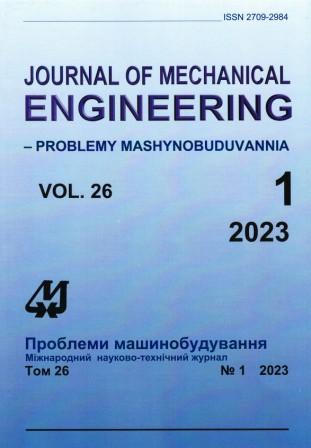Analysis of the Stress State for a Layer with Two Incut Cylindrical Supports
Abstract
The stress state of a homogeneous isotropic layer under the action of a spatial static external load is studied. Two circular cylindrical supports are cut into the body of the layer parallel to its borders. The supports and body of the layer are rigidly coupled. The spatial problem theory of elasticity is solved using the analytical-numerical generalized Fourier method. The layer is considered in the Cartesian coordinate system, the supports are considered in the local cylindrical coordinates. Stresses are set on the upper and lower surfaces of the layer. The supports are considered as cylindrical cavities in a layer with zero displacements set on their surfaces. Satisfying the boundary conditions on the upper and lower surfaces of the layer, as well as on the cylindrical surfaces of the cavities, a system of infinite integro-algebraic equations, which are further reduced to linear algebraic ones, is obtained. An infinite system is solved by the reduction method. In the numerical studies, the parameters of integration oscillatory functions are analyzed, problems at different distances between supports are solved. A unit load in the form of a rapidly decreasing function is applied to the upper boundary between the supports. For these cases, an analysis of the stress state was performed on the surfaces of the layer between the supports and on the cylindrical surfaces in contact with the supports. The numerical analysis showed that when the distance between the supports increases, the stresses σx on the lower and upper surfaces of the layer and the stresses τρφ on the surfaces of the cavities increase. The use of the analytical-numerical method made it possible to obtain a result with an accuracy of 10-4 for stress values from 0 to 1 at the order of the system of equations m=6. As the order of the system increases, the accuracy of fulfilling the boundary conditions will increase. The presented analytical-numerical solution can be used for high-precision determination of the stress-strain state of the presented problems type, as well a reference for problems based on numerical methods.
Downloads
Published
Issue
Section
License
Copyright (c) 2023 В. Ю. Мірошніков, О. Б. Савін, М. М. Гребенніков, В. Ф. Деменко

This work is licensed under a Creative Commons Attribution-NoDerivatives 4.0 International License.
All authors agree with the following conditions:
- The authors reserve the right to claim authorship of their work and transfer to the journal the right of first publication of the work under the license agreement (the agreement).
- Authors have a right to conclude independently additional agreement on non-exclusive spreading the work in the form in which it was published by the jpurnal (for example, to place the work in institution repository or to publish as a part of a monograph), providing a link to the first publication of the work in this journal.
- Journal policy allows authors to place the manuscript in the Internet (for example, in the institution repository or on a personal web sites) both before its submission to the editorial board and during its editorial processing, as this ensures the productive scientific discussion and impact positively on the efficiency and dynamics of citation of published work (see The Effect of Open Access).

